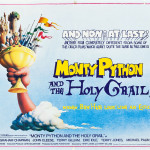Listen to some stand-up comedy and true stories about flying experiences, learn some vocabulary and consider what makes these comedy routines funny. [Download]
 Introduction
Introduction
This episode features a few humourous accounts of people’s experiences on aeroplanes. Why have I chosen this topic? Well, why not? There’s no Christmas connection or anything, it’s just an episode I’ve been thinking about for ages and I finally got around to doing it. Actually, the main reason is so I can play you some stand up comedy, which hopefully you will both learn from and enjoy. I always want to play you some stand up comedy – because it’s brilliant and I want to share it with you! The subject of flying is something that is pretty universal, so I thought there was a good chance you’d be able to relate to it. Also, comedians all seem to have material based on flying. it’s a really common topic for stand-up, precisely because it’s universal but also because it’s a pretty bizarre experience in some ways!
Please be aware that there is some rude language in this episode.
Let’s listen to some stories of people flying.
Almost all of these are comedy routines by stand up comedians.
One of them is an inspirational story, which has some laughs in it.
3 things I wonder:
- If you get the details of the stories
- If you find them funny
- If you know all the vocabulary
To understand the subtleties I’ll give you a quick summary of each story before you listen. Then you’ll know the main events, leaving you to focus on the funny details.
To deal with the humour, I will explain what I find funny about each sketch. Obviously, humour is totally subjective – it depends on the person and there is no universal form of humour. However, I also find that humour is one of the last things that you can pick up when you’re learning a language. Learners tend not to find the same things funny as native speakers – perhaps because they don’t get the cultural reference points, or because you can’t understand it well enough to get all the jokes immediately. Instant comprehension of all the subtle shifts in tone and meaning is very important for finding something funny. Most of the funny aspects of these routines are not obvious jokes. It’s far more subtle than that. So, let’s see if you can pick up on those subtle things and see the humour in each bit. I’ll give you my assessment of “what I think is funny” after each bit.
So, you’ll get summaries for general understanding, and some commentary on the humour as well.
There’s also vocabulary, which I don’t think will be such a problem but we will see. I’ll explain some items of vocabulary that appear.
And as if that’s not enough already, there are scripts of every stand up routine that you hear in this episode. You can check them out on the webpage and use them to understand every single word if that’s what you fancy doing.
So, I would like to know which is your favourite story or routine in this episode. you’re going to hear 5 stories/routines. Please vote for your favourite using the poll on the page for this episode.
In no particular order you will hear these things:
- Louis CK – The Time I Thought I Would Die
- Eddie Izzard – Biscuits On A Plane
- Jerry Seinfeld – At the Airport
- Ric Elias – 3 Things I Learned When My Plane Crashed
Louis CK’s Story
Summary
- Louis talks about a time when he was scared for his life. He thought he was going to die. It’s a true story.
- He was flying from Indianapolis to New York and there was a delay because of a technical problem with the plane. The fuel guage was broken.
- The pilot decided to fly even though he didn’t know how much fuel was in the plane.
- Louis just assumed that the pilot knew what he was doing. He unquestionably put his trust in the pilot. Why do we do this?
- Louis expresses some concern about the rather relaxed approach to safety which the pilot is taking.
- The plane is still delayed because of bad weather at their destination.
- The pilot informs the passengers that he is going to lie to the tower, telling them they’re going to Philadelphia, even though they’re going to go to new York.The plan is to say they’re going to Philadelphia, and then at the last minute, ask for permission to land in New York. He thinks the weather is not so bad there.
- Again, Louis expresses concern about the attitude of the pilot and he wonders why the pilot is sharing this information with him.
- Louis and the other passengers basically accept the situation because, perhaps stupidly, they have faith in the pilot and the whole situation.
- The weather during the flight is terrible. There was a big storm.
- He managed to listen to the conversation between the plane and the tower in new York.
- The tower didn’t allow the plane to land in New York because of bad weather.
- They could have run out of fuel and fallen out of the sky at any moment.
- suddenly the tower in NY announced that the airport was closed due to bad weather.
- The pilot panicked and requested urgent permission to land.
- The tower guy allowed him to land, but he was quite annoyed.
- The pilot immediately went in for landing.
- It was an extremely stressful and dangerous landing in low visibility.
- The pilot and all the passengers were extremely emotional at the end.
- Even the taxi drivers at the airport were surprised by the dramatic landing of the plane.
Louis CK – When I Thought I Was Going to Die (From the album “Word – Live at Carnegie Hall”)
Buy “Word – Live at Carnegie Hall” by Lous CK here https://www.louisck.net/purchase/word-live-at-carnegie-hall
I’ll tell you this story about one time that I thought I was going to die. I think it’s the only time where I thought “why wouldn’t this be when I die?”
I was on a plane. I’ve been on a lot of planes in a lot of shitty weather and stuff, but this shit was fucked up.
I was in Indianapolis on a plane, waiting to take off, and we’re sitting there and the pilot comes on, and he says “Hi folks, erm, the fuel gauge is broken so we’re waiting for maintenance.”
So, we wait, about 20 minutes. Then he comes back on,
“Folks the fuel gauge is still broken, but we’re going to go anyway. We don’t know how much fuel we have, but we feel confident that it will be okay so we’re going to go.”
And I’m thinking, okay, well, he’s a pilot, I’m sure he’s going by some manual that says, you know, ”(if) the fuel gauge breaks, call maintenance. If they’re not there in 20 minutes, fuck it. Fuel gauges are overrated, just go, you’re fine. Just top it off and remember what happened.”
So then we still don’t take off and the guy comes back on, “err folks we have another problem, LaGuardia Airport in New York won’t give us clearance to take off because the weather’s been bad there intermittently, so we’re going to wait for that.”
So we wait 20 minutes. Then he comes back on, “Folks, LaGuardia still hasn’t given us clearance, but we’re going to go anyway. We’re looking at the radar, we think the weather will be fine. So what we’re going to do is say that our destination is Philadelphia, we’ll get clearance to go there. Halfway to Philadelphia we’ll switch courses to LaGuardia airport and we’ll be probably there in a few minutes.”
I swear to god he said this.
First of all, I’m pretty sure you’re supposed to be honest with the dude in the tower. Does the tower have to go “Really? You’re going to… come on! Tell me where you’re going!”
And why is he telling us this shit? Am I going to have to corroborate this lie if we get pulled over by the sky police at some point in the flight? “Oh no we’re totally going to Philly, I’ve got a brother there and err, we’ve got a thing in Philly”
But I’m still fine with it because we’re travellers on the plane, like “yeah, I’ve got a thing, fuck it, I’m immortal, just go please. Yes, go into marginal weather, with shoddy equipment, secretly. I totally support this plan.”
So, we take off. We get above where we are right now, and it’s just a black motherfucker of a cloud. It’s just like The Wizard of Oz. It’s just there are trees throwing apples at us, it’s crazy. It’s just horrible, and we’re “GUGGGGGUGUGUGU” the whole flight, and we’re making these circles, and me and the guy next to me are both listening to the tower. You know how you can plug into your seat sometimes and you can listen to the tower talk to the airplanes, and we keep hearing our guy trying to get clearance to land, from LaGuardia.
PILOT: “Ah; this is Delta 288 requesting clearance to land.”
TOWER: “Ah, that’s a negative 288. Low visibility.”
A few minutes go by.
PILOT: “Ah, this is 288. We would really like clearance to land.”
TOWER: “Yeah, that’s a negative 288.”
Like he was getting annoyed. And meanwhile, we’re just circling, and burning this vague amount of fuel. We could just stop being an airplane at any second.
And then we hear this. This is all true. The LeGuardia guy comes on and says,
“This is LaGuardia airport to all area airplanes, we are closed for the night, zero visibility, not safe for landing, please divert to Philadelphia, Pennsylvania or Boston.”
And then we hear our guy.
“This is Delta 288, we need to land now! We have no fuel! We have no fuel we have to land right now!”
Interesting.
Then there’s a pause, and then we hear this.
“Well, then, clear to land then 288”
That’s how he said it, like “Dude… (sighs) No-one can see okay? But, just, I … (sighs) I guess all the dumb decisions you made today have made this a good one. Just take a shot, I’m going home. Just fuckin’, turn the lights off after you crash, I don’t give a shit frankly. By the way you’re not supposed to be here you fucking liar you said you were going to Philly.”
So as soon as we get clearance, we just “nyaaaaaaa”, like we start bulleting, “nyaaaaaaa…” We’re either flying desperately towards the ground or falling. I don’t know that there’s a difference.
We come out of the clouds and there’s the fucking earth, right fucking there! It’s right there! That’s what low visibility means. We come out of the clouds and “Oh fuck it’s right there oh jesus!”
And the plane just “nyaaaaaa…” And you can feel the plane go “Oh fuck, I can’t do that, what are you nuts?” We go “brrrrrrr” and veer over the highway, and I swear to god I saw people in their cars go “what the fuuuck?”
And we hit the runway like sideways, like “kapoof!” And the pilot comes back on, all true I swear to god, he’s totally out of breath, he’s like (heavy breathing & shaky voice) “welcome to LaGuardia airport, New York City, (crying) you may turn on your cellphones now and you may call your loved ones.”
He said that. He said “You may call your loved ones” and everybody on the plane was crying and rocking back and forth just sobbing, calling their husbands and their wives. I’m divorced, what am I (going to say) “Hi remember you hate me? Well I almost died.”
And I got in a cab, and the cab driver goes “that was a very bad landing.” I was like, “How did you know that was me?”
“That’s the only plane that landed in 4 hours. We all watched, the drivers, we said ‘they are going to die’”
What I think is funny about this
It’s always a bit of a bad idea to try and explain humour, because it usually kills all the comedy, but what the hell, let’s do it anyway.
Firstly, there aren’t really any jokes in this bit. It’s just the way Louis tells the story, adding some descriptions, some sarcasm, some attitude and drama. That’s it really. The first big laugh comes from the line “fuck it”. As if a manual for a pilot would say “If the fuel guage doesn’t work, fuck it. Just go.” Of course a manual wouldn’t write that. Instead, this indicates the negligent attitude of the pilot who is flauting the safety regulations. This is what is going through the pilot’s head, and is clearly a huge act of negligence.
There’s something funny about copying the voice of a pilot, especially when he’s acting rather irresponsibly. We all hear those pilot’s announcements. This is the guy who we are all trusting our lives to. He usually sounds quite relaxed. Pilots have a certain kind of voice, thankfully. If they sounded different it could be worrying. Anyway, copying his voice is quite amusing.
“I think you’re supposed to be honest with the dude in the tower”. This is a really funny line. It’s understating the formal protocol the pilots must follow. Being honest with the ‘dude’ in the tower is a fundamental responsibility of the pilot. The choice of the word ‘dude’ is also funny because we’re talking in informal terms about normally formal things. This highlights the careless attitude of the pilot.
“Why is he telling us this shit? Do we have to corroborate his story?” True – why was he telling them? The character of the pilot is like a shitty friend who expects you to lie for him.
Everyone on the flight just accepts everything that’s happening. This is a really good observation. We put our trust in people in authority positions very easily. We consider ourselves immortal when we’re not responsible for our own safety. It’s the same in taxis. We never put on our seatbelts in the backs of taxis. Why not?
Louis is just a great storyteller. He brings the story alive with certain detailed descriptions to elicit fear, surprise and so on. He knows just how much detail should be given in the correct places. The humourous bits are delivered with excellent timing. They’re not obvious jokes. He’s a master. He makes it look easy. This is not easy.
Then we have the irritated conversation between the pilot and the tower. The pilot is a total dick and the tower is getting annoyed with him. You don’t expect a pilot to behave like that.
Then the dramatic moment when Louis hears the pilot panicking, which he describes as “interesting”, clearly understating how alarming it must have felt to hear that.
The tower is so pissed off, and this is expressed with the line “Well, clear to land then” which is delivered with so much frustrated despondency by Louis, as if the guy in the tower is a tired parent who has run out of patience with his child. This kind of frustration in a conversation is usually over something like homework or another petty disagreement. In this case people’s lives are involved. Louis’ performance is great. He adds loads of attitude into the conversation between the pilot and the tower. Again, the pilot is a dick, who has everyone’s lives in his hands.
Louis even gives a voice to the plane which has a personality of its own, complaining that the pilot is pushing it too hard – “Dude, I can’t do that!” Expressing how low to the ground they were he mentions people in their cars who he could actually see mouthing the words “What the fuck?” which must have been very scary!
This is just a dramatic and engaging story, which seems to be true, told in a way which highlights the general irony of being at the mercy of a pilot making bad decisions.
By demonstrating that the pilot is emotional and out of breath after the landing, Louis allows us to imagine what we couldn’t see in the cockpit of the plane: the pilot had a really hard time landing the plane and is seriously traumatised. For some reason, letting the audience imagine something for themselves is quite funny. Also, Louis’ impression of the emotional pilot is just quite amusing.
The choice of phrase “You may call your loved ones” also emphasises the emotional nature of the landing. Louis considers calling his ex-wife, who hates him, which clearly would be a pointless move. This highlights Louis’ sense of alienation, and the fact that nobody really cares about him. Louis is like a classical comedy character – lonely, sad, alienated. We also get another character – that of the taxi driver who we learn justwatched the plane land, fully expecting everyone on board to die.
That’s it. Again, explaining it does NO JUSTICE to the quality of Louis’ work. Generally, I find that it helps if you care about the story you’re listening to. If you’re emotionally invested in it, it’s more engaging and therefore funnier. If you believe it’s true for example, it’s likely to be funnier. I expect that’s why Louis often says “I swear this is true”. Please listen to the routine again. Please care about it – you’ll find it more enjoyable and rewarding.
In case you were in any doubt about the comic value of that routine, Louis CK is widely considered to be perhaps the funniest stand-up working on the scene at the moment. He is a celebrated comedian. Anyone who knows anything about comedy knows that he’s great. If you were doubting if he really is that funny, well, I would say yes he is. In the end of course, humour is subjective – but it may help you find it funny if you know that many others do too.
Eddie Izzard – Biscuits on a Plane
Here’s my basic version of Eddie’s routine about eating biscuits on a plane. Again, I’m doing this so you can understand the main point, and then compare this description with Eddie’s version. It may allow you to notice the humourous aspects of it.
- Eddie describes a flight from Cork in the Republic of Ireland to Belfast in Northern Ireland. It’s not a long flight, and so the plane is really small. In fact there were only about 6 people on board.
- He walked across the runway to the tiny plane, carrying his bags. It felt like he was in the Beatles.
- The pilot was waiting by the plane, which reminded him of going on holiday with his Dad when he was a kid.
- He describes a few things which felt odd about being on such a small plane. The pilot was right there in front of them, and yet he still did the formal announcement like on bigger flights.
- He talks about the fact there was no co-pilot, but that the pilot had brought coffee and biscuits to share with everyone.
- He talks about the safety considerations of flying, including the idea of ‘bird strike’ which is when birds can go through the jet engine of a plane, causing an accident, although Eddie doesn’t agree with the term bird strike, because the birds aren’t choosing to strike the engine, but rather they are being sucked into the engine against their will.
- The pilot on the tiny plane gave the safety announcements, but people don’t usually listen to the safety announcements, so perhaps the staff should make it sound like there’s going to be an accident just to make sure people listen properly.
- Eddie makes fun of the life jacket and other safety procedures.
- Eddie describes the fact that the in-flight refreshments were some coffee and biscuits shared by the pilot. He notices that the pilot has a secret stash of chocolate biscuits and jammy dodgers, which he doesn’t share with the other passengers. He gets into an argument with the pilot over why he deserves to be given chocolate biscuits. This ends in the pilot crashing the plane into a mountain in order to win the argument.
- Eddie dies at the end of the story.
Eddie Izzard – Biscuits on a Plane
Download “Glorious” by Eddie Izzard in iTunes here https://itunes.apple.com/us/movie/eddie-izzard-glorious/id334208655
I had to do a flight last year on a tour which as from Cork to Belfast. There were only 6 passengers, and someone turned up and said “Well, we’re not going to put you on the 747 because that would be laughable, so we’ve got a Volkswagon Beetle with wings for you.
We had our bags, we didn’t give them to anyone, we just walked with them. Obviously I didn’t walk like this, that was comedy, I was walking like this, because that’s a better mime position, otherwise you just think I’m walking, but that’s with bags you see, in case you ever need it, you know in Nigeria and… They’re very big in mime in … anyway…
So yes I was walking along with the bags and going through. It’s a very small airport, you just go through a wooden door and someone goes “beep” “Oh there’s a problem there, I’d better check”.
And walking across the runway to get to the plane. If you ever do that, walking with your bags across a runway to an aeroplane you feel like The Beatles with squirrels going “Aahhhh”
We got there and the pilot was right by the plane. It was just like going on holiday with your Dad. He was going “Come on! Come on! Come on you don’t need that! Right!”
“That’s my bag! Bloody hell”
“Come on get in we’re going to miss the clouds, come on!”
So we get in and he was taxiing over to the runway, “Come on heads down put your head down I can’t see! Come on!”
And he was right there. We were sitting right here. I could touch him on the shoulder, just like in the car with your Dad. He was doing… even though you could turn around and talk to us he was still doing “This is your pilot speaking. Welcome to flight 1 from here to there. We’re going to be flying at a height of 10 feet, going up to a height of 12.5 feet if we see anything big. Your co-pilot today is a thermos of coffee.”
I thought there was a rule in flying that you have to have two pilots in case one goes “Oh for fuck’s sake” (and collapses) and the other one goes “I’ll take over!” Dun-da-de-dun-da-daa “I’ve got one of my own!”
People in the back “I’ve got one!”
We had a thermos of coffee that was going to fly us home.
And he’s there and doing the stuff and we’re getting into flying and, they have a word in airports, the industry, the airways industry have a thing called bird-strike, bird-strike it’s called. It’s when a flock of birds, just flying along “oh what a wonderful day, the sun’s…” splat! They go straight through a jet engine! It’s called bird-strike and it’s a misnomer, it’s not true because the birds aren’t striking, it’s an ‘engine-suck’. It’s an ‘engine-making-bird-soup-melange’ you know?
These birds aren’t going, “Who’s for bird strike eh? Johnny Human’s got these big metal buggers and they piss me off! I vote we go for bird strike! Alfie, Ginger, Stevie, Feathers, Stephens, Big Beak O’Reilly, Jimmy The Penguin, are you with me? Oh you’re a penguin so you stay here. Come on let’s do bird strike! Dun-da-de-dun-da-daa Faster faster! 747!” SPLAT
And just before they go through, do they go “look there’s Rod Stewart in first class” splat.
We don’t know.
But umm, they do the safety announcements there. My guy on my plane was going, “the safety instructions… the safety instructions are here, next to me. If you see me go through this door then please follow me quickly.”
If you’ve been in a big aeroplane recently, no-one is listening. It’s a problem I believe because noone’s listening to the security announcements, you know the safety things, because everyone’s going “yeah yeah, there there there lights, flash flash … and death”
Umm, it’s a kind of “yeah alright, you know, huuu”
But the pilots have been told to sort of, you know, pick up the importance of these speeches, and there going “please do listen to the safety… please do because we’ve changed things around now, so yeah you don’t know what we’re doing. We’re putting the lifejacket on back to front. Some of the safety exits are false now, they’re not true at all. Listen very carefully because I’ve got a bad feeling about this flight. I don’t think we’re going to make it.”
After that announcement everyone’s going “Show me! Show me! Show me everything! Private showing – show me again, that’s good, now I’m putting it on now, fuck it I’m putting it on now!”
Let’s all have a cup of coffee thanks. And they have these lifejackets, and they, you pull it and pffffff and you’ve got a little pipe here for top up. I don’t know about you but I don’t want top up. I want stays up. Top up implies hole in, implies having to (blows heavily) I want fucking stays up no hole in the first place thank you very much! Bloody top up? No, it’s all a bit, sort of, ‘tea and crumpets with the vicar’ “top up” you know. You crash in the atlantic, bobbing around, going “oh you survived as well… care for a top up? You couldn’t top me up could you? No I didn’t need it I’m just trying to break the ice. Hey float over here float over here. Look: two pipes – pan pipes! Doo doo doo doo doo.”
It’s 2000 miles to Europe, 1000 miles to America, you’ve got your whistle “Peeeeee” The little light going “beep beep” And after a while a pilot fish comes up and goes “Eh Eh! That’s my gag! WHat weird people” And there’s Noah shooting around in a speedboat going “Nurrrrrr- If anyone’s got big ears you can get in and sit on the side. Photos for the Bible”
So I was in my aeroplane in my small aeroplane and the guy’s there, and we have drinks and light refreshments, when we get above the clouds, and coffee comes back from the thermos, and you go ooh, cheers, ta mate and that goes back, and he had this wicker basket with biscuits in, digestive, you know not terribly interesting. So I take the best ones, and it goes back to the guy at the back who goes “all these are crap”. You know when you’re not hungry but you get offered a biscuit, you want better than that, you know. “I didn’t want anything, but err, what have you got? Ohh”
So I’m nibbling my biscuits and drinking my coffee and I notice out of the corner of my eye the pilot reaches under his jacket and pulls out chocolate biscuits and in a flash I realise he’s hidden them there and taken them out of the wicker basket and hidden them underneath, and I knew that because that’s what I would have done. You know when you’ve got friends round, “Do you want some biscuits, I’ll just go and get you some biscuits and you’re in the kitchen and you go “Oh, I’ll just have one” Someone comes over, “Do you want a hand?” “Oh no no no. Just letting this mouse run over my hands here” [This is a VISUAL JOKE]
So the pilot’s there eating chocolate biscuits and I’m there going “Heeeeey, chocolate biscuits? Eh! Digestive! Crap, biscuit.”
He’s going “Get off! (I’m the) pilot! You know, stress! Chocolate biscuit! What the hell?”
And I’m going “No! Customer! Customer’s always right. Digestive crap biscuits?”
“Fuck off! Five years training for this! Hard time! Chocolate biscuits. Perks of the trade.”
“I don’t agree…”
“Fuckin’…” Naaaaaaaaaa (He starts flying towards the ground)
“Hold on hold on!”
Naaaaaaaaa
“What were you saying about chocolate biscuits?”
“No, fine! HAve the chocolate biscuits! I don’t care I don’t care!”
Nyaaaaaaaa (he steadies the plane) “…chocolate biscuits”
20 minutes later, reaches in and pulls out jammy dodgers!
“Jammy dodgers?!”
NAAAAAAAA (he flies at the ground again)
BOOM!
And we hit a mountain, and I died.
So that was the end of that plane flight, and err… and that is also the end of the show, so thank you very much for being here. Good night.
What’s Funny About This? (In my opinion)
Really, it’s all about Eddie and his idiosyncratic style. It’s a cute story, with some observational comedy around the subject of flying, but really it’s Eddie’s unique postmodern approach which makes it special for me.
The way he talks is amusing to me.
He bends reality. It’s surreal.
He deconstructs the whole performance – doing mime jokes and generally being self-conscious.
You know, I think with Eddie, either you get it or you don’t and no amount of explaining will change your mind. He’s a bit like Marmite.
Some specific things from the routine:
“We’ve got a Volkswagon Beetle with wings for you” – an image to describe the crappy little plane.
The visual mime joke about the way he walks. This is just a joke about how miming an action has to be quite specific because different mimes suggest different things. You have to watch the video.
You go through the wooden door and someone goes ‘beep’. The security is so basic that it’s just a person saying ‘beep’, not a security system.
The comparison between the pilot and his Dad, which highlights how small and cosy the flight was, while also having nostalgiac comedy value. Sometimes comedians will get lots of laugh from inciting the audience to just remember something from the past – like old mobile phones described in detail or in this case those memories of going on holiday with your parents. Comedians often do this – describe shared past memories in detail and the audience gets a pleasant nostalgic thrill from it.
The other thing is just making observations, with a specific attitude. This is the basis of a whole form of stand up comedy – observational humour. Lots of comics do this. Just observe or notice specific details about commonly experienced things, and express them with an attitude (usually questioning the strangeness of these small details we all experience). Jerry Seinfeld is the master of this. Eddie Izzard does it a lot, and in this routine he does quite a lot of this – talking about the safety routines on planes, the lifejacket and so on. We can all relate to this. Also, the juxtaposition of these familiar things in such a small plane.
Questioning the logic behind the term ‘bird strike’ and renaming it ‘engine suck’, and then voicing the thoughts of birds who team up to take down aeroplanes. For some reason they are portrayed like brave young WW2 era British pilots, like in the battle of Britain.
Then there’s the whole scene with the pilot and his secret supply of biscuits. I don’t really know why this is funny – I can’t explain it. I just enjoy Eddie’s account of arguing with the pilot and the reasons why they should or shouldn’t be allowed to share the chocolate biscuits.
Then the cheeky ending in which he dies, which is a playful deconstruction of first person story archetypes. Of course it’s impossible for him to have died at the end of the story. In the video I love the cheeky look on Eddie’s face at this point.
I just love Eddie.
Did I mention that I met him and had dinner with him earlier this year? Just saying…
Jerry Seinfeld – Airplane Flights
This is a famous comedy routine by one of the most well-known comedians in the world, but I shouldn’t build it up because it could end up being an anti-climax. Don’t expect too much, just try to follow what he’s saying. Basically, Jerry talks about various aspects of airports and flying, zoning in on some of the more ridiculous or pointless aspects of that experience. Observational comedy. Here are the observations. For me, it’s all about Jerry’s delivery, timing and choice of words.
Jerry’s Observations
- Jerry sarcastically points out that the people who work in airport security are quite incompetent and unmotivated, and probably not very bright. He wonders why the staff are so bored and lazy, using sarcasm.
- He describes the fact that the woman you typically see at security is quite fat and her trousers are stretched almost to breaking point. This would be quite cruel if it wasn’t so well worded. Jerry has a reputation for being a clean comic, but if you look more closely he is actually quite aggressively anti-social. He holds the whole world in contempt, which is hugely enjoyable because let’s face it – we hate queueing up in the airport and having to listen to the safety announcement. He’s just voicing the thoughts we all have in our heads in those situations. “What’s with these people? I mean, really?”
- He suggests that the x-ray machine is useless because it’s impossible to identify any objects, and the guy looking at the screen is unable to identify any bombs or weapons or anything.
- He wonders why the taps (or faucets) in airports have those special ‘on-off’ buttons. Why don’t they have normal taps? Don’t they trust us to use normal taps?
- He wonders why sandwiches are sooo expensive in airports.
- He wonders why the pilot tells us everything he’s going to do, and in a self-satisfied voice. We don’t need to know really. All we care about is that we get to our destination.
- He observes that the safety announcement is patronising – as if we need to be told how to open that old fashioned belt buckle. Of course he doesn’t mention this is explained to us for legal reasons, instead focusing on the fact that it’s just odd and annoying the way we are patronised so much in these situations.
- He notices that the stewardesses are very vague when pointing out the emergency exits during the safety announcement. The arm movements are always pretty vague aren’t they? It also looks like some sort of musical number in a Broadway production.
- He mentions that everything on the plane is tiny, even the language they use to diminish problems during the flight.
- He points out the idiosyncrasies of the aeroplane toilet, particularly the presence of a hole for razor disposal. Who is shaving on these flights?
Jerry Seinfeld – Airplane Flights
But I love to travel. I love it whether it’s a car or whether it’s a plane.
I like to get out there, I like to keep it moving.
I love airports. Feel safe in the airports thanks to the high caliber individuals
we have working at X-ray security.
How ’bout this crack squad of savvy motivated personnel?
The way you wanna setup your airport’s security, is you want the short, heavy set women at the front with the skin tight uniform.
That’s your first line of defense.
You want those pants so tight the flap in front of the zipper has pulled itself open, you can see the metal tangs hanging on for dear life.
Then you put the bag on the conveyor belt. It goes through the little luggage car wash.
Then you have the other genius, down at the other end, looking at the little X-ray TV screen.
This Eistein has chosen to stand in front of X-rays 14 hours a day as his profession.
Looking in that thing…
I have looked in that TV screen. I cannot make out one object.
He’s standing there… “What is that? A hairdryer with a scope on it?”
“That looks ok. Keep it moving.”
“Some sort of bowling ball candle? Yeah, I got no problem with that, just…”
“You know, we don’t wanna hold up the line.”
So, I go to the bathroom in the airport.
What is the story on the sinks in airport bathrooms that they will not give us a twist-it-on twist-it-off, human-style faucet?
Is that too risky for the general population?
Too dangerous? We gotta install the one-handed, spring-loaded, pain-in-the-ass Alcatraz-style faucet.
You know, those ones you gotta go: “Hey, boy I got a little water there”
“Hey I got a couple of drops.”
What is it they think we would do with a faucet?
Turn them all on full, run out into the parking lot,
laughing, pushing each other into the bushes?
“Come on, the water’s on, let’s go!”
“I turned it on full blast.”
“You idiot! We’re businessmen, we’re gonna miss our plane.”
“Who cares! Water!”
That’s how they think we’re gonna act.
Do the people that work in these little shops in the airport have any idea what the prices are every place else in the world?
“Yeah, $14 a tuna sandwich. We think that’s fair.”
Then you get on the plane. The pilot of course always has to come on the PA system.
This guy is so excited about being a pilot, he can’t even stand himself.
“Well, I’m gonna take it up to about 20,000.”
“Then I’m gonna make a left by Pittsburg.”
“Then I’m gonna make a right by Chicago.”
“And then I’m gonna bring it down to 15,000.”
He’s giving the whole route, all his moves.
We’re in the back going: “Yeah, fine.”
“You know, just do whatever the hell you gotta do. I don’t know.”
“Just end-up where it says on the ticket, really.”
Do I bother him with what I’m doing?
Knocking on the cockpit door: “I’m having the peanuts now.”
“Yeah, that’s what we’re doing back here.”
“I thought I’d keep you posted.”
“I’m not gonna have them all now, I’m just gonna have a few.”
“I don’t wanna finish it because it’s such a big bag.”
Then the stewardesses have to come out.
They have to do their little emergency equipment show.
You know, that thing they do. One of them reads it, the other one acts it out.
“Hey, we have seatbelts and oxygen masks.”
“Things for you to use.”
They show you how to use the seatbelt, in case you haven’t been in a car since 1965.
“Oh, you lift up on the buckle! Oh!”
“I was trying to break the metal apart.”
“I thought that’s how it works.”
“I was gonna try and tear the fabric part of the belt.”
“I thought if I could just get it started…”
Then they’re always pointing out the emergency exits,
always with that very vague point though, isn’t it?
“Where the hell would these places be?”, would you say.
The plane’s at a 90 degrees angle, your hair is on fire,
you’re looking for this.
How you think you’re gonna do there?
She’s thinking: “I’m getting out before you’re getting out.”
“You’re dead, you’re dead, I’m gone.”
Then they always have to close that first class curtain, too.
They always give you that little look.
“Maybe if you had worked a little harder… I wouldn’t have to do this.”
It’s all a tiny world on the airplane, isn’t it?
There’s always that little tiny table there, tiny computer,
little cramped seats, tiny food, tiny utensils,
tiny liquor bottles, tiny bathroom, tiny sink, tiny mirror, tiny faucet.
So, there’s a small problem, there’s gonna be a slight delay,
we’re gonna be a little late.
I always go in the airplane’s bathroom, even if I don’t have to go,
I gotta go in there.
It’s nice. It’s like your own little apartment on the plane, isn’t it?
You go in there, lock the door, the light comes on after second.
It’s like a little surprise party.
But I’m always impressed with the amount of equipment that they have in that place.
I mean it’s little, but they got tissues, towels, closets, compartments,
tiny slot for used razor blades. They always have that.
Who is shaving on the plane?
And shaving so much they’re using up razor blades?
Is this what’s happening?
What? Is the wolf man flying in there, for Christ’s sakes?
Who could shave that much?
What’s funny about this?
Well, it’s the wording, the timing, the delivery, the world-weary attitude, the fact that I know exactly what he means, and all the observations he points out.
I simply suggest that you listen again, and read the transcript and buy “I’m Telling You For The Last Time” on CD or DVD. It’s a masterclass in observational comedy.
The stuff about the staff is sarcastic. He describes them as ‘high-calibre’, ‘Einstein’ and ‘geniuses’ when in fact they’re quite the opposite. My favourite line is “Look at this crack squad of savvy motivated personnel.” A crack squad is a specialised team, like a team of excellent soldiers. The best of the best. ‘Savvy’ means that they have expert knowledge. ‘Motivated’ you know, and ‘personnel’ is a professional word to refer to members of staff. He’s describing them like a highly skilled team of experts. Obviously, they appear to be lazy, unmotivated and unambitious.
The bit about the x-ray machine always cracks me up. He describes the thoughts of the ‘Einstein’ who has chosen to sit in front of an x-ray machine for 14 hours a day. The guy is looking into the screen, completely misidentifying dangerous items – “What is that? A hairdryer with a scope on it?” – This is clearly some kind of gun.
“That looks ok. Keep it moving.”
“Some sort of bowling ball candle? Yeah, I got no problem with that, just…” – This is obviously a bomb.
But he lets all of them through.
Voicing the decision making process of the people who priced the sandwiches always amuses me. “14 dollars a tuna sandwich? Yeah we think that’s fair.” It’s clearly unfair, and ‘it’s funny because it’s true!’
I love the bit where he voices the smug pilot explaining the route,
This guy is so excited about being a pilot, he can’t even stand himself.
“Well, I’m gonna take it up to about 20,000.”
“Then I’m gonna make a left by Pittsburg.”
“Then I’m gonna make a right by Chicago.”
“And then I’m gonna bring it down to 15,000.”
He’s giving the whole route, all his moves.
We’re in the back going: “Yeah, fine.”
“You know, just do whatever the hell you gotta do. I don’t know.”
“Just end-up where it says on the ticket, really.”
Do I bother him with what I’m doing?
Knocking on the cockpit door: “I’m having the peanuts now.”
I love that bit about “I’m having the peanuts now”
It goes on.
To be honest, it’s just a class act, it really is. I hope you enjoy it. That’s the point, it’s for your enjoyment. Sometimes it’s worth remembering that you should just go with this kind of comedy. Don’t try too hard to understand it on a deep level or anything. Just enjoy the delivery, the choice of words, the to and fro with the audience, the rhythm of the comedian telling jokes and constructing stories and the audience coming back with laughter at regular intervals. It’s very pleasant and pleasing to me. I can’t imagine something better to listen to as a way of improving your English, except just any episode of LEP of course ;)
Ric Elias – 3 Things I Learned When My Plane Crashed
This is not a stand-up routine, it’s just an awesome true story and we love engaging true stories on LEP don’t we? I thought it would be a good way to end this episode of the podcast.
This is an account of someone who was on board US Airways Flight 1549 which had to crash land in the Hudson River after a bird strike during take-off from LaGuardia airport in 2009. The pilot was a real hero as he managed to land in the Hudson River with no loss of life.
Here the storyteller reflects on what it is like to face your death, and what he learned from that. It’s worth remembering that we shouldn’t take anything for granted!
Ric Elias – 3 Things I Learned When My Plane Crashed
[ted id=1130 lang=en]
Imagine a big explosion as you climb through 3,000 ft. Imagine a plane full of smoke. Imagine an engine going clack, clack, clack, clack, clack, clack, clack. It sounds scary. Well I had a unique seat that day. I was sitting in 1D. I was the only one who could talk to the flight attendants. So I looked at them right away, and they said, “No problem. We probably hit some birds.” The pilot had already turned the plane around, and we weren’t that far. You could see Manhattan. Two minutes later, three things happened at the same time. The pilot lines up the plane with the Hudson River. That’s usually not the route. (Laughter)He turns off the engines. Now imagine being in a plane with no sound. And then he says three words –the most unemotional three words I’ve ever heard. He says, “Brace for impact.” I didn’t have to talk to the flight attendant anymore. (Laughter) I could see in her eyes, it was terror. Life was over.
1:22
Now I want to share with you three things I learned about myself that day. I learned that it all changes in an instant. We have this bucket list, we have these things we want to do in life, and I thought about all the people I wanted to reach out to that I didn’t, all the fences I wanted to mend, all the experiences I wanted to have and I never did. As I thought about that later on, I came up with a saying, which is, “I collect bad wines.” Because if the wine is ready and the person is there, I’m opening it. I no longer want to postpone anything in life. And that urgency, that purpose, has really changed my life.
2:02
The second thing I learned that day — and this is as we clear the George Washington Bridge, which was by not a lot — I thought about, wow, I really feel one real regret. I’ve lived a good life. In my own humanity and mistakes, I’ve tried to get better at everything I tried. But in my humanity, I also allow my ego to get in. And I regretted the time I wasted on things that did not matter with people that matter. And I thought about my relationship with my wife, with my friends, with people. And after, as I reflected on that, I decided to eliminate negative energy from my life. It’s not perfect, but it’s a lot better. I’ve not had a fight with my wife in two years. It feels great. I no longer try to be right; I choose to be happy.
2:52
The third thing I learned — and this is as your mental clock starts going, “15, 14, 13.” You can see the water coming. I’m saying, “Please blow up.” I don’t want this thing to break in 20 pieces like you’ve seen in those documentaries. And as we’re coming down, I had a sense of, wow, dying is not scary. It’s almost like we’ve been preparing for it our whole lives. But it was very sad. I didn’t want to go; I love my life. And that sadness really framed in one thought, which is, I only wish for one thing. I only wish I could see my kids grow up. About a month later, I was at a performance by my daughter — first-grader, not much artistic talent … … yet. (Laughter) And I’m bawling, I’m crying, like a little kid. And it made all the sense in the world to me. I realized at that point, by connecting those two dots, that the only thing that matters in my life is being a great dad. Above all, above all, the only goal I have in life is to be a good dad.
4:06
I was given the gift of a miracle, of not dying that day. I was given another gift, which was to be able to see into the future and come back and live differently. I challenge you guys that are flying today, imagine the same thing happens on your plane — and please don’t — but imagine, and how would you change?What would you get done that you’re waiting to get done because you think you’ll be here forever? How would you change your relationships and the negative energy in them? And more than anything, are you being the best parent you can?
4:40
Thank you.
4:42
(Applause)
He described the crash landing as a miracle, but was it really?
What do you think?
[socialpoll id=”2240609″]
























